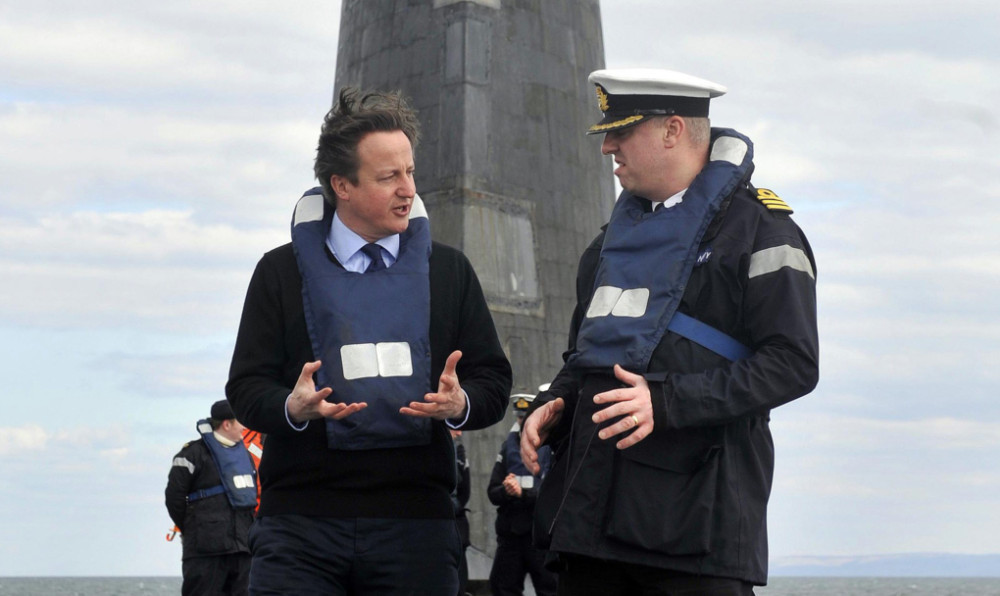
DEFENCE is suddenly at the top of the referendum campaign, following David Cameron’s recent visit to Scotland.
Mr Cameron, and indeed all the Unionist parties, believe this issue is one of the weak points in the armoury of those supporting an independent Scotland.
On a visit to the Trident nuclear submarine base at Farlane, the Tory leader questioned whether anyone could seriously argue, in view of the current threat from North Korea, that now was the time to surrender Britain’s nuclear deterrent. The Conservatives, unlike their Lib Dem coalition partners, have committed to replacing the Trident nuclear deterrent, which is based on the Clyde.
The Prime Minister claimed defence jobs were more secure and Scotland counted for more on the world stage because it was part of the UK. “Scotland has a world renowned and highly-skilled defence sector that employs more than 12,600 people and has annual sales in excess of £1.8 billion,” he pointed out.
“It plays a key role in equipping and supporting the UK Armed Forces. From iconic industries like shipbuilding on the Clyde and at Rosyth, to cutting-edge, hi-tech manufacturing.”
And, he claimed, being part of the UK opened doors for the Scottish defence industry around the globe.
On Trident, he said the programme offered good value, at an annual cost of just 1.5% of Britain’s benefits bill.
However, the SNP welcomed Mr Cameron’s intervention in the debate, claiming that 109 people had applied for party membership on the day the Prime Minister came to Scotland.
Deputy First Minister Nicola Sturgeon said his visit underlined how out of touch the UK Government was with the priorities of people across Scotland.
She also said that all of the available evidence pointed to Scotland being opposed to Trident the most recent poll showed 80% were against.
“Trident isn’t the answer to the threats we face as a country,” she claimed.
“It diverts resources from conventional defence, which in Scotland has faced disproportionate cuts by successive UK governments, and the vast amounts of money spent on Trident and its replacement would be far better spent on other priorities.”
She said the SNP are pledged to get rid of Trident and claimed only an independent Scotland would be able to do so.
“However, the Scottish Government is clear in its intention to retain Faslane as a conventional naval base and joint forces HQ guaranteeing that it will be key in ensuring Scotland is properly defended.”
Independence campaigners also claim that figures show Scotland contributes far more than is actually spent on defence in Scotland.
They also point to disproportionate cuts in defence north of the border, with the loss of 8,800 military and civilian MoD jobs between 2000 and 2012.
That’s a reduction of more than a third in Scotland, compared to just a fifth across the UK. And there are varying claims of just how many people the Trident base employs.
Unionists claims more than 6,000, while their opponents point out that only 520 jobs are directly connected to Trident, with the others supporting conventional ships and weaponry.
During his visit, Mr Cameron pointed to the importance of UK naval orders for the Clyde yards.
And this has been emphasised by the House of Commons Scottish Affairs Committee in a report published last week.
Ian Davidson MP, chair of the committee, said it was clear that the British Government wanted to retain the capacity to design and build warships within the UK.
“In these circumstances it is difficult to see how the Clyde yards can have any long-term future in a separate Scotland,” he added.
He did, however, point to problems before the referendum date.
“The Clyde yards will soon complete their allocated share of the aircraft carrier order and will run out of work.”
Mr Davidson has arranged for the Scottish Affairs Committee to meet with shop stewards and trade unions from Clyde yards and Rosyth tomorrow to plan how to secure a future for shipbuilding in Scotland.
Defence is said to the the first priority for any government. And it will be for Yes Scotland to prove that this will also be the case in an independent Scotland.

Enjoy the convenience of having The Sunday Post delivered as a digital ePaper straight to your smartphone, tablet or computer.
Subscribe for only £5.49 a month and enjoy all the benefits of the printed paper as a digital replica.
Subscribe